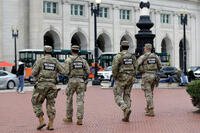Martha Raye isn't a name heard much these days. The comic actress and singer was a star of stage and screen who worked in show business for around 60 years by the time of her death in 1994.
In her radio days, she was known for her performances on Al Jolson's "Cafe Trocadero." On television, she was best known for "The Martha Raye Show," which featured a string of notable guest stars. She was probably best known for her USO work during World War II, the Korean War and the war in Vietnam, where she entertained troops so often, she earned the nickname "Colonel Maggie."
Raye was born Margie Reed in Montana in 1916. By the age of 18, she was already on film, performing on the screen and radio in the 1930s. When the United States entered World War II, Raye was more than ready to perform for the troops. Her first stop came in 1942 when she was sent to England. From there, she took her USO show to North Africa with three of her friends, Carole Landis, Kay Francis and Mitzi Mayfair.

Their adventures from England to North Africa were immortalized in the 1944 movie, "Four Jills in a Jeep." Along the way, she was granted the honorary rank of a lieutenant colonel in the Marine Corps and Army Special Forces for her service to the troops, but the military didn't seem to know who they were dealing with when it came to Raye.
The actress was well-known for pulling that honorary rank when the moment arose. On more than one occasion, Raye was told her performances would have to be put on hold or flights diverted to aid the wounded. She would pull rank so the pilots could go directly to the wounded men and take them to safety, rather than drop her off first. Once on the ground in a medical ward, Raye would help medical personnel in whatever way was needed.
She assisted in medical units so often that it soon became a rumor that she was trained as a nurse before her silver-screen days. This wasn't true; the closest the actress ever got to nursing was serving as a candy-striper in a hospital for a time. As the war ground on, Raye got plenty of on-the-job experience.
She continued performing for the troops in Korea and Vietnam, where she formed an especially close bond with the men in the Army's Special Forces.
"They ask so little and give so much," she said during the Vietnam War. "The least we can do back home here is give them the love, the respect and the dignity that they, our flag and our country deserve."
Raye served on the front lines of America's 20th-century conflicts for a total of 24 years, but to her, the Special Forces were heroes through and through. She entertained them in places no one else would go and tended their wounds at the same time. Raye never complained about the field conditions and lived the same way the deployed troops did the entire time. In 1993, President Bill Clinton awarded her the Presidential Medal of Freedom for her lifetime of dedication to U.S. troops.
Raye suffered from myriad health problems at the end of her life, including heart disease and Alzheimer's disease. She died of complications from pneumonia at age 78 in 1994. Her last wish was to be buried at Fort Bragg, the final resting place of many of her heroes. She was buried in October 1994 with full military honors, the only woman interred there.

-- Blake Stilwell can be reached at blake.stilwell@military.com. He can also be found on Twitter @blakestilwell or on Facebook.
Want to Learn More About Military Life?
Whether you're thinking of joining the military, looking for post-military careers or keeping up with military life and benefits, Military.com has you covered. Subscribe to Military.com to have military news, updates and resources delivered directly to your inbox.















